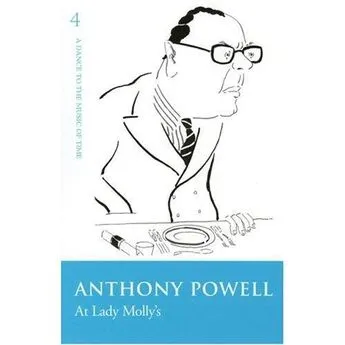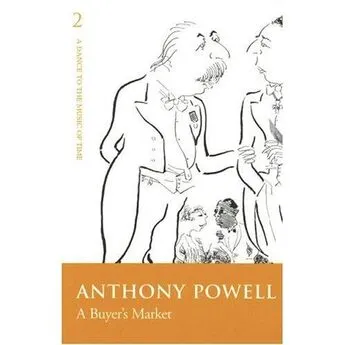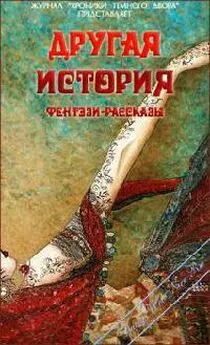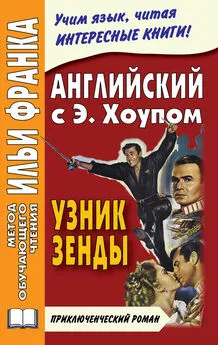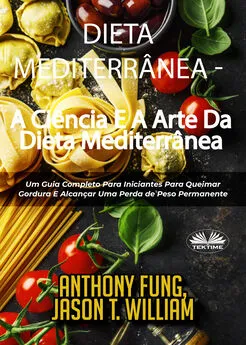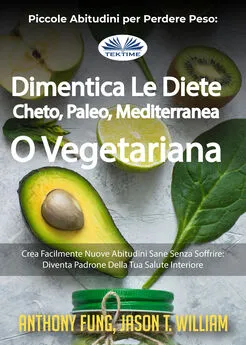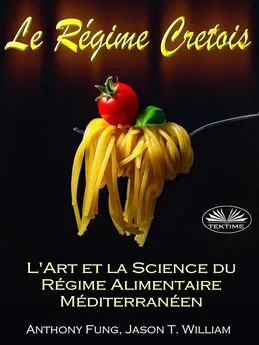Anthony Powell - At Lady Mollys
- Название:At Lady Mollys
- Автор:
- Жанр:
- Издательство:неизвестно
- Год:2005
- ISBN:нет данных
- Рейтинг:
- Избранное:Добавить в избранное
-
Отзывы:
-
Ваша оценка:
Anthony Powell - At Lady Mollys краткое содержание
A Dance to the Music of Time — his brilliant 12-novel sequence, which chronicles the lives of over three hundred characters, is a unique evocation of life in twentieth-century England.
The novels follow Nicholas Jenkins, Kenneth Widmerpool and others, as they negotiate the intellectual, cultural and social hurdles that stand between them and the “Acceptance World.”
At Lady Mollys - читать онлайн бесплатно полную версию (весь текст целиком)
Интервал:
Закладка:
These felicitations were handsome on Smith’s part, although Isobel, in spite of being several years younger than her sister, evidently had no wish for comparison between them to be drawn in a manner which made her, by representing, as it were, those girls not yet engaged, seem to come out second best. However, if Smith hoped by drawing attention to engagements in general to dispose of the question of champagne, he was disappointed.
‘Anyway, Smith, do go and have a look,’ said Isobel. ‘My throat is absolutely parched.’
Erridge might have no wish to drink champagne, even if available, but he had also clearly decided that things had gone too far for the idea to be abandoned without loss of face on his own part. Smith, too, must finally have realised that, for he now set down the coffee tray and abandoned the room in full retreat, moving like a man without either enthusiasm or hope.
‘Smith doesn’t seem to get any soberer,’ said Susan, when he had shut the door.
‘As a matter of fact, Smith hasn’t had one of his real bouts for a long time,’ said Erridge.
He spoke reprovingly.
‘So drink is Smith’s trouble, is it?’ said Quiggin, with great geniality. ‘You never told me that. I often thought he might be one over the eight. That explains a lot.’
‘Smith sometimes takes a glass too much,’ said Erridge, shortly, perhaps beginning to notice, and resent, the change in Quiggin’s manner since the arrival of the girls. ‘I usually pretend not to notice. It must be an awful job to be a butler anyway. I don’t really approve of having indoor men-servants, but it is hard to run a house this size without them, even when you live, like me, in only a small part of it. I can’t get rid of the place, because it is entailed — so there it is.’
He sighed. There was rather an awkward pause. Erridge was perhaps getting cross. It was possible that the entail was not a popular subject in the family.
‘What sort of luck will he have in the cellar?’ asked Isobel. ‘I must say champagne is just what I need.’
‘I really don’t know,’ said Erridge. ‘As I told you, I hardly drink anything myself.’
‘Do you keep it locked?’ asked Susan.
Erridge coloured a little.
‘No,’ he said. ‘I like trusting people, Susan.’
Susan showed no disposition to accept this observation as a snub, although her brother was obviously displeased by her flippancy. It was natural that anyone should be annoyed whose evening had been so radically altered by force of circumstance. He had been looking forward to some hours of discussing plans for the magazine, discussion which my own presence would not have hindered. A third, and unconcerned, party might even have made Quiggin more tractable, for a certain amount of patron-protégé conflict clearly took place between them. Now, the arrival of his sisters had transformed the room into a place not far removed from one of those haunts of social life so abhorrent to him. Instead of printing charges, advertising rates, the price of paper, names of suitable contributors, their remuneration, and other such matters which, by their very nature, carried with them a suggestion of energy, power and the general good of mankind, he was now compelled to gossip about such a trifle as Susan’s engagement, a subject in which he could not feel the smallest interest. This indifference was not, I felt sure, due to dislike of Susan, but because the behaviour of individuals, consanguineous or not, held, as such, no charm whatever for him. His growing vexation was plain: not lessened by Quiggin’s manifest betrayal of principles with the two girls.
‘Do you like driving, Lady Susan?’ asked Quiggin.
‘Oh, all right,’ she said. ‘We rattled along somehow.’
‘Have you had your car long?’
When he asked that, she began to blush furiously again.
‘It is a borrowed car,’ she said.
‘It’s Roddy’s,’ said Isobel. ‘Just to show him what married life is going to be like. Sue took his car away from him, and made him go back by train.’
‘Oh, shut up,’ said her sister. ‘You know it was the most convenient arrangement.’
This cross-fire continued until the return of Smith. He brought with him a bottle, which he banged down quite fiercely on the table. It was Mumm, 1906: a magnum. Nothing could have borne out more thoroughly Erridge’s statement about his own lack of interest in wine. It was, indeed, a mystery that this relic of former high living should have survived. Some latent sense of its lofty descent must from time to time have dominated Smith’s recurrent desire, and held him off. I could not help reflecting how different must have been the occasions when its fellows had been consumed; if, in truth, we were to consume this, which seemed not yet absolutely certain.
‘Just the one left,’ said Smith.
He spoke in anguish, though not without resignation. Erridge hesitated. Almost as much as Smith, he seemed to dislike the idea of broaching the wine for the rest of us to drink. A moral struggle was raging within him.
‘I don’t know whether I really ought not to keep it,’ he said. ‘If there is only one. I mean, if someone or other turned up who—’
He found no individual worthy enough to name, because he stopped suddenly short.
‘Oh, do let’s, Alf,’ said Mona.
She had hardly spoken since the arrival of Susan and Isobel Tolland. Her voice sounded high and strained, as if she were suffering strong nervous tension.
‘Oh, yes,’ said Erridge. ‘You’re right, Mona. We’ll break its neck and celebrate your engagement, Sue.’
He was undoubtedly proud of fetching from somewhere deeply embedded in memory this convivial phrase; also cheered by the immediate, and quite general, agreement that now was the moment to drink so mature — so patriarchal — a vintage. Smith disappeared again. After another long delay he returned with champagne glasses, which had received a perfunctory rub to dispel dust accumulated since at least the time of Erridge’s succession. Then, with the peculiar deftness of the alcoholic, he opened the bottle. The explosion was scarcely audible. He poured the wine, a stream of deep dull gold, like wine in a fairy story, at the same time offering an almost inaudible, though certainly generous, appreciation of the occasion by muttering: ‘I’ll be drinking your ladyship’s health myself later this evening.’ Susan thanked him. Erridge, who had himself refused a glass, shifted his feet about uneasily. Traces of the Mumm’s former excellence remained, like a few dimly remembered words of some noble poem sunk into oblivion, or a once famous statue of which only a chipped remnant still stands.
‘Have you informed Hyde Park Gardens yet?’ asked Erridge.
He spoke as if that were a new thought; one that worried him a little.
‘I rang up,’ said Susan.
The champagne had perhaps helped her to recover casualness of tone.
‘What was said?’
‘Great delight.’
I knew this reference must be to their stepmother, Katherine, Lady Warminster, of whom Lovell had given me some account, describing her as ‘frightfully amusing’. Invalid and somewhat eccentric, she was, I suspected, a less easy-going figure than Lovell’s words might lead one to suppose. There seemed indications that her stepchildren regarded her as formidable. She had always hated the country, so that her husband’s death had provoked none of those embarrassments, not uncommon, in which an heir has to apply pressure to enjoy sole rights in his inheritance. On the contrary, the difficulty had been to persuade Erridge to take over Thrubworth when Lord Warminster, a traveller and big-game hunter of some celebrity, died abroad. That had been five or six years before, when Erridge’s political views were still comparatively undeveloped. Lovell’s picture of Erridge’s early days depicted a vague, immature, unhappy young man, taking flats and leaving them, wandering about on the Continent, buying useless odds and ends, joining obscure societies, in general without friends or interests, drifting gradually into his present position.
‘I’m glad the news was well received,’ said Erridge.
‘So was I,’ said Susan. ‘Jolly glad.’
This interchange on the subject of their stepmother was somehow of a much closer intimacy than anything said previously about the engagement. In relation to Lady Warminster, the Tollands presented a united front. Their sentiments towards her were not, one felt, at all unfriendly; on the contrary, rather well disposed. They were at the same time sentiments charged with that powerful family feeling with which no outward consideration, not even love or marriage, could compete, except upon very unequal terms.
‘Have you been over the house?’ asked Isobel, beside whom I was sitting on the sofa.
We had drunk the champagne, and the atmosphere had become more relaxed. Erridge heard the question, and spoke himself, before I could answer. Although he had had nothing to drink, he had not been able to withstand the increased warmth of relationship that the rest of us had drawn from the wine.
‘Why, no, you haven’t seen the house yet,’ he said. ‘Would you by any chance like to go round, Jenkins? There is really little or nothing of any interest to see, I must warn you, except a hat that is supposed to have belonged to the younger Pitt.’
‘I should like to go round very much.’
‘I expect you will prefer to stay where you are, J.G.,’ said Erridge, who may have decided to take this opportunity of making a tour of the house as a kind of counterblast to Quiggin’s demand for champagne. ‘And I don’t expect you will want to go round either, Mona, as you have seen it all several times. Jenkins and I will walk through the rooms very quickly.’
However, both Quiggin and Mona insisted that they would like to take part in the tour, in spite of its repetitive character, so far as they themselves were concerned; and the Tolland girls agreed, rather loudly, that there was nothing they enjoyed more than their eldest brother’s showmanship in this particular undertaking.
‘Those anti-fascist pamphlets will have to wait for another night,’ Quiggin muttered to Erridge.
He spoke, as if to salve his conscience, as he rose from his chair.
‘Oh, yes,’ said Erridge testily, as if he wished to be reminded of the pamphlets as little as Quiggin. ‘Anyway, I want to go through them carefully — not with a lot of people interrupting.’
He strode firmly in front of us. We followed down several passages, emerging at last at the head of a broad staircase. Erridge descended. Half-way down, where the wall of the landing faced the hall, hung the full-length portrait, by Lawrence, of an officer wearing the slung jacket of a hussar. Erridge stopped in front of the picture.
‘The 4th Lord Erridge and ist Earl of Warminster,’ he said. ‘He was a very quarrelsome man and fought a number of duels. The Duke of Wellington is supposed to have said of him: “By God, Erridge has shown himself a greater rake than Anglesey and more damn’d a fool than ever was Combermere. It is my firm belief that had he been present on the field of Waterloo we should never have carried the day.”‘
‘But that was only when the Duke was cross,’ said Isobel. ‘Because he also remarked: “Erridge spoke out last night when Brougham extolled the virtues of Queen Caroline. I never saw a man so put out of countenance as was Brougham by his words.” I always wonder what he said. Of course, one knows in a general way, but it would be nice to know the actual phrases.’
‘I think he probably used to score off Wellington,’ said Susan. ‘And that was why the Duke was so sharp with him. Erridge was probably the more cunning of the two.’
Читать дальшеИнтервал:
Закладка:
